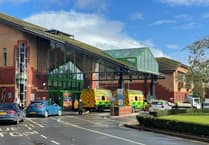Residents have been warned that keeping coronavirus rates low will be key to living with the virus as England comes out of lockdown this summer.
Rates in Devon are the fifth lowest of any upper tier authority in England, with South Hams having the lowest rates of any lower tier authority.
But the rate in which infection rates have declined has begun to slow – albeit affected by a large care home outbreak in Sidmouth – with residents being warned that there is still work to do as despite the low rates, they are nowhere near the position as of last summer when rates were in the single figures.
The Team Devon Local Outbreak Engagement Board meeting on Thursday morning heard that while Devon was in a good place at the moment, residents are being urged not to push the boundaries and stick to the rules to keep the numbers as low as possible.
Devon’s infection rates are currently at 22.4/100,000, for the week leading up to March 5, with rates in East Devon the highest in the county, at 55.4/100,000.
Simon Chant, public health specialist, said that the rise in East Devon was reflective of a large outbreak in a care home, adding that as rates in the community have dropped to a low level, then if there is an outbreak in a setting, it will be apparent on the map and have a large impact on infection rates in an area.
Steve Brown, Devon’s director of public health, added: “We are thinking about what the next several months looks like as we won’t be living in a zero covid society so we have to think how we live with covid as safely as possible.
“The most important thing we have to do is keep rates low and the starting position is really good but it is still comparative with rates from September. We need good surveillance and intelligence in terms of the data and essential to manage any outbreaks, to have good test, trace and isolation plans and we have increased testing capacity, and the vaccination programme which will help that as well.
“We can make workplaces and schools as covid secure as possible but all of us have to listen to the public health messages around social distancing and face masks, and all of them are required to live with covid safely.
“We need to keep rates low but we will still see occasional outbreaks and the ability to stamp on them as quickly as possible is crucial. There is a balance around the economy and cautiously opening up society, and we have done so well in Devon, but it does require residents of Devon to not drop guard to keep rates low.”
And Mr Brown also asked families with school-age children to do all they can to help prevent the spread of coronavirus.
The call comes as schools and colleges invite all students back this week and as pupils begin to be regularly tested using rapid, lateral flow tests.
“With the significant increase in the number of students becoming routinely tested, we are likely to see an upturn in the number of positive cases,” said Steve Brown.
“Regular testing of people who show no signs of having coronavirus is going to be essential over the coming weeks and months because identifying people who test positive will mean that they can self-isolate and help prevent spreading the virus.
“Any parents who haven’t yet given their consent for their child to be tested at school, I urge them to give their consent.
Dr Phil Norrey, the council’s chief executive, said that while Devon’s rates were low, they were still above what would have triggered a ‘red alert’ last summer – albeit slightly incomparable due to the vastly increased testing that is now being carried out.
He added: “So there is still work to do and it is not unfinished business, and rates are still not low enough to feel comfortable, so it comes down to individual behaviour and don’t do things that you don’t need to do as if we slip back, we could see numbers go up again.”
But the meeting also heard that the impact on Devon’s economy as a result of the third lockdown means that there will be a deeper decline that initially expected, with a contraction of around 14 per cent, compared to the previously forecast eight per cent, and the recovery will take longer, with it being 2023 at least until things are back to normal.
Keri Denton, head of economy, enterprise and skill, added that while unemployment had stabilised at around the five per cent, around 12 per cent of people in Devon were still on furlough, so the ‘true figure’ for unemployment was likely to be around the 10 per cent mark.
And she added that there had been a cumulative loss of around £1.8bn in the tourism and hospitality sector across the county over the last 12 months, and that even during last summer when restrictions were lower and business could open, they were still losing money.



